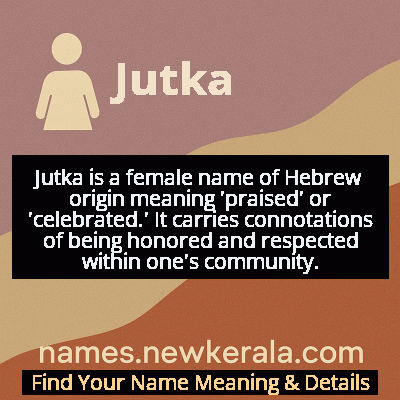Jutka Name Meaning & Details
Origin, Popularity, Numerology Analysis & Name Meaning of Jutka
Discover the origin, meaning, and cultural significance of the name JUTKA. Delve into its historical roots and explore the lasting impact it has had on communities and traditions.
Name
Jutka
Gender
Female
Origin
Hebrew
Lucky Number
9
Meaning of the Name - Jutka
Jutka is a female name of Hebrew origin meaning 'praised' or 'celebrated.' It carries connotations of being honored and respected within one's community.
Jutka - Complete Numerology Analysis
Your Numerology Number
Based on Pythagorean Numerology System
Ruling Planet
Mars
Positive Nature
Generous, passionate, energetic, and humanitarian.
Negative Traits
Impulsive, impatient, moody, and can be overly emotional.
Lucky Colours
Red, maroon, scarlet.
Lucky Days
Tuesday.
Lucky Stones
Red coral, garnet.
Harmony Numbers
1, 2, 3, 6.
Best Suited Professions
Military, sports, philanthropy, leadership roles.
What People Like About You
Courage, energy, leadership, generosity.
Famous People Named Jutka
Jutka Bíró
Actress
Renowned Hungarian stage and film actress known for her dramatic roles
Jutka Varga
Folk singer
Celebrated Hungarian folk vocalist preserving traditional music traditions
Jutka Rona
Poet
Hungarian-Jewish poet known for her lyrical works about identity and heritage
Jutka Halász
Educator
Influential teacher and advocate for Jewish education in Hungary
Name Variations & International Equivalents
Click on blue names to explore their detailed meanings. Gray names with will be available soon.
Cultural & Historical Significance
Throughout Hungarian history, Jutka has maintained its popularity particularly in Jewish families, serving as a bridge between religious tradition and local culture. The name experienced various periods of usage fluctuation, often reflecting broader social attitudes toward Jewish identity in Central Europe. Despite historical challenges, Jutka has persisted as a meaningful name choice that honors both Hungarian linguistic traditions and Jewish religious heritage, creating a unique cultural synthesis that continues to resonate with families today.
Extended Personality Analysis
Women named Jutka are often perceived as strong-willed, resilient individuals with deep emotional intelligence. They typically exhibit a blend of traditional values and modern thinking, showing particular strength in challenging situations. Their name's meaning of 'praised' often manifests in their desire to earn respect through genuine achievement rather than seeking superficial recognition.
Jutkas are frequently described as loyal friends and family members who value deep, meaningful relationships. They tend to be observant and thoughtful, with a natural ability to understand others' perspectives. Many display creative talents and intellectual curiosity, often excelling in fields that require both analytical thinking and emotional sensitivity. Their Hungarian cultural connections often contribute to a strong sense of identity and appreciation for artistic expression.
Modern Usage & Popularity
In contemporary times, Jutka maintains a niche popularity primarily within Hungarian-speaking communities and among families with Hungarian Jewish heritage. While less common among younger generations than in previous decades, the name has seen a modest revival as part of the broader trend toward traditional and culturally significant names. It's particularly favored by parents seeking names that honor family traditions while maintaining a distinctive Central European character. The name's usage remains concentrated in Hungary and Hungarian diaspora communities, with occasional adoption by non-Hungarians attracted to its melodic sound and rich cultural background.
Symbolic & Spiritual Meanings
Symbolically, Jutka represents the intersection of praise, heritage, and resilience. The name carries connotations of being celebrated or honored, suggesting someone who brings light and recognition to their community. It symbolizes the preservation of cultural identity through generations, particularly the maintenance of Jewish traditions within Hungarian society. The name also embodies the concept of quiet strength and dignity, reflecting the historical journey of Central European Jewish communities while maintaining hope and cultural continuity.

